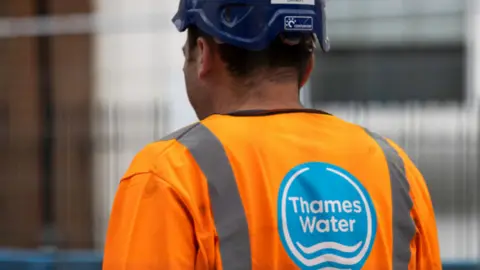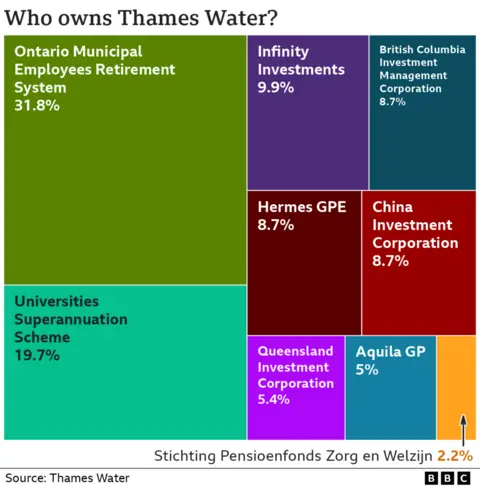WARNING THESS WATER COLLECTION CAN BE FOLLOWED TO TAX PUBLIES AND PENSION SALES

Business Editor, BBC News
 Getty Images
Getty ImagesThe retirement plans of the water regulator and Thames’ retirement trustees, taxpayers and Thames water employees would suffer if the largest water company in the UK was temporarily expropriated.
Ofwat did not argue if it could cost billions of pounds of taxpayers to control Thames in case of collapse of the debt company.
According to the documents seen by the BBC, approximately 12,000 existing and old employees could see that future retirement rights have been reduced.
The Court of Appeal, the future of Thames Water is in balance because it thinks if an emergency loan can continue for the problematic public office.
The majority of Thames and lenders supported a plan to see the company with a borrowing of 20 billion pounds, lending 3 billion pounds to keep a long time to complete a restructuring.
The supplier serves about a quarter of the population of England, mostly in a region of London and Southern England and employs 8,000 people. It is expected to run out of cash completely in mid -April.
3 billion pounds rescue loan was approved after a significant Supreme Court war last month, However, Liberal Democratic Deputy Charlie Maynard, who argued that the group that gave a smaller loan was the most and defends more debt in the public interest is not in the public interest, launched an objection.
The Court of Appeal makes allegations as to whether the loan will be given with a expected decision at the beginning of the next week.
The documents seen by the BBC rejected the claims that ofwat claimed that Thames added to the debt of MaSnard and that the collapse of the administration would result in a negligible cost for taxpayers.
In a letter to the court, he insisted that the water editor Thames would be banned from reclaiming additional interest payments from customer bills.
He said that a figure governed by Maynard did not see “no evidence to support” that the administration would cost the government £ 66 million.
The regulator did not comment on the estimation that Thames would cost taxpayers to £ 4 billion.
Environmental Secretary Steve Reed told Thames Water that the government intervention would “take billions of goods and years”.
Separately, approximately 12.000 Thames Water Pension Program members expressed their concerns that the board of trustees said that if the company entered the administration, they may be “significantly and damaging”.
If Thames would collapse, these members would probably be transferred to the lifeguard retirement fund, which provided lower future benefits than promised by the original plan.

Thames hopes that the borrowing suffix of £ 3 billion will provide enough time to start dealing with many problems.
After a series of sewage discharge and leakage, the company has faced heavy criticisms of performance in recent years.
Since the terrible situation of the company’s finance first emerged 18 months ago, the government is waiting to put Thames into private administration.
However, in the future, water resources and waste services for household people will normally continue.
The first priority of the company, if the loan is approved, will be to reduce the large stack of debt by asking the lenders to accept a discount on what they owe.
Secondly, in the next five years by Ofwat, invoices will be to object to the decision that inflation can only increase 35%. Thames argued that it should be increased by 53% during the period.
The third move of both of the above will be to draw new investors to pump money for a job that suits public anger and regulatory fines.
Although the government, regulatory and retirement committees are eager to avoid collapse, there are many people who think that Thames Water should be removed from the misery – rather than a financial and operational crisis to another.
What is mentioned by the delegations of the trustees of the retirement and retirement is likely to have a cost for both taxpayers and workers.





:quality(85):upscale()/2024/06/12/675/n/2589278/510651536669bafb8d98b4.00990634_.jpg?w=390&resize=390,220&ssl=1)